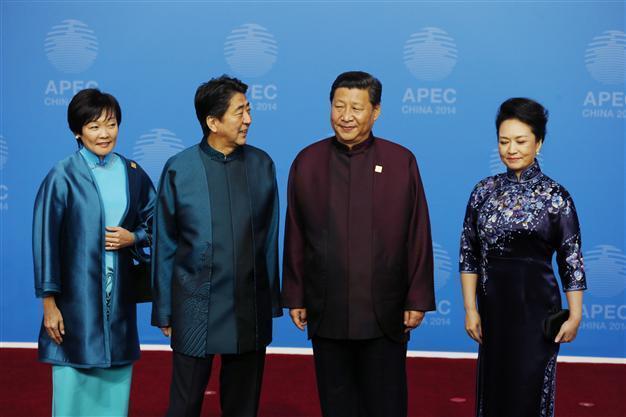Japan-China summit 'first step' to better ties: Abe
BEIJING – Agence France-Presse

Japan's Prime Minister Shinzo Abe, second Left, and his wife Akie, left, are greeted by Chinese President Xi Jinping and his wife Peng Liyuan, before a welcome dinner for APEC leaders at the Beijing National Aquatics Center in Beijing, Monday, Nov. 10, 2014. AP Photo
Japan and China have taken the "first step" on the road to improving badly strained relations, Prime Minister Shinzo Abe said Nov. 10 after a half-hour summit with President Xi Jinping in Beijing.The two men held their first face-to-face meeting since coming to power and after presiding over two years of animosity that some observers have warned was leaning perilously close to military conflict.
"It was the first step for improving relations by returning to the starting point of mutually beneficial relations based on common strategic interests," Abe told reporters after the brief summit on the sidelines of the Asia-Pacific Economic Cooperation (APEC) meeting.
The summit, the first in three years, comes after a long period of bitter hostilities focused on a territorial dispute and Japan's 20th century treatment of China.
Relations plunged in 2012 when Tokyo nationalised part of the Senkaku islands, an uninhabited chain in the East China Sea.
It insisted the move was a mere administrative change of ownership, and said it had done so to prevent their being bought by an inflammatory nationalist who wanted to build on them.
China, which claims the islands under the name Diaoyus, reacted with fury, accusing Japan of upsetting a delicate equilibrium that had held for decades. Japan has refused even to acknowledge the existence of competing claims.
The islands became the scene of regular confrontations between paramilitary vessels as both countries pressed their ownership amid rising nationalist sentiment.
Military jet fighters also weighed in as China unilaterally carved out an air control zone and battleships eyed each other warily over the horizon, leading to warnings a mistake could result in a military conflict that would draw in the United States.
That appeared to have taken a step back on Monday with the Abe-Xi meet.
"I asked him that we implement a maritime communication mechanism, and I think we will start working on concrete steps toward it," Abe told reporters referring to a hotline Japan has frequently urged.
Ties thawed in recent months as intense but low-profile diplomacy began amid concerns on both sides that their highly-interdependent economies were suffering.
The icebreaker summit came after Tokyo and Beijing issued finely worded statements on Friday, which both spun as a victory on their own terms.
"The two sides have acknowledged that different positions exist between them regarding the tensions which have emerged in recent years over the Diaoyu Islands and some waters in the East China Sea," an English-language statement from the Chinese authorities said.
It added that they "agreed to prevent the situation from aggravating through dialogue and consultation and establish crisis management mechanisms to avoid contingencies".
Chinese media insisted the wording amounted to an acknowledgement that a dispute existed, while Japan said the agreement to disagree was only over the cause of tension -- which it said was Chinese aggression.
At Monday's summit, which took place in the Great Hall of the People in Beijing, Abe and Xi were seen shaking hands, offering a picture that will be highly symbolic.
Abe made brief contact with Chinese Prime Minister Li Keqiang last month at an international gathering in Italy, followed by other meetings between senior officials of both countries and a visit to China by a major Japanese business delegation.
















